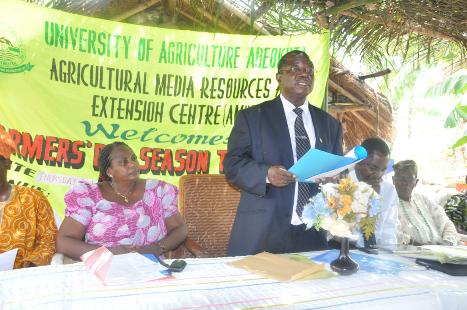
Representative of the Vice-Chancellor, Deputy Vice-Chancellor, Development, Prof. Segun ‘Lagoke delivering his speech.
On his right is the Director of AMREC, Prof. (Mrs) Carolyn Afolami and left, Director, IFSERAR, Prof. Segun Osinowo
The Vice-Chancellor, University of Agriculture, Abeokuta (UNAAB), Professor Oluwafemi Olaiya Balogun has declared that the potentials of the agricultural sector in contributing to the economic growth of the nation, is still far from being fully realized.
He blamed the development on inherent technical, socio-economic, organizational and institutional constrains, which according to him led to rural under-employment, depressed living conditions and massive rural-urban migration of able-bodied youths.
Professor Balogun stated this, while opening a Pre-Season Training Workshop for farmers, organized by the University’s Agricultural Media Resources and Extension Centre (AMREC).
Represented by the Deputy Vice-Chancellor Development, Professor Segun Lagoke, Professor Balogun said in order to curtail the constraints, there was an urgent need for the intensification of extension services and the provision of required supports for enhanced productivity of farmers.
The Vice-Chancellor pointed out that UNAAB has been responding to these demands through the remarkable progress of its tripodal mandate of Teaching, Research and Extension Services, with direct focus on rural communities.
The Vice-Chancellor described the Pre-Season training as another step in the right direction, noting that UNAAB had on annual basis, been training selected farmers on different aspects of resource mobilization in preparation for farming seasons.
Professor Balogun who commended AMREC for bringing experts to train the farmers urged the latter to take advantage of the training to enhance their skills and productivity.
Earlier in her Welcome Address, the Director of AMREC, Professor Carolyn Afolami, while stressing the need for the training, lamented that despite favourable climate, abundant land mass and teeming farming population , Nigeria is still facing acute food scarcity.
Professor Afolami pointed out that with only five percent farming population, in the United States of America, the country has achieved food sufficiency while Nigeria with over 75 per cent farming population is still ravaged by hunger and poverty.
Prof. Afolami blamed the development on lack of fund, technical know-how, farming equipment, unfavourable pricing of farm produce and marketing, among others.
She assured the participating farmers from twenty-one villages, that AMREC will work towards ensuring they benefited from the Federal Government’s N1 billion agricultural loan and usage of Tractors, which had been of concern to them.
Speaking in the same vein, the Director of the Institute of Food Security, Environmental Resources and Agricultural Research (IFSERAR), Professor Segun Osinowo, frowned at the lackluster approach to farming in the Southwest, saying the idea of relinquishing farming to hired-hands, cannot be productive.
Professor Osinowo observed that the attitude was responsible for the inability of farmers from the region to produce pepper at appreciable commercial quantity, thus depending on massive importation from the North.
Prof. Osinowo said as part of efforts to check the menace, IFSERAR is looking towards encouraging production of portable machine as a practical replacement to hoes and cutlasses.
